RMIT Cultural Diversity: Enhancing Asian Student Engagement
VerifiedAdded on 2023/03/31
|6
|883
|263
Report
AI Summary
This report identifies and analyzes the cultural issues affecting Asian students' participation at RMIT University, a public research university in Melbourne, Australia. It highlights challenges such as educational differences and social disconnect that lead to feelings of isolation and impact academic performance. The report suggests measures including cultural clubs, diversity training, and inclusive co-curricular activities to promote cultural diversity and improve the integration and experience of Asian students, ultimately aiming to foster a more inclusive and supportive campus environment. The research uses inductive approach based on investigation of RMIT's multicultural team to provide solutions for the identified problem.
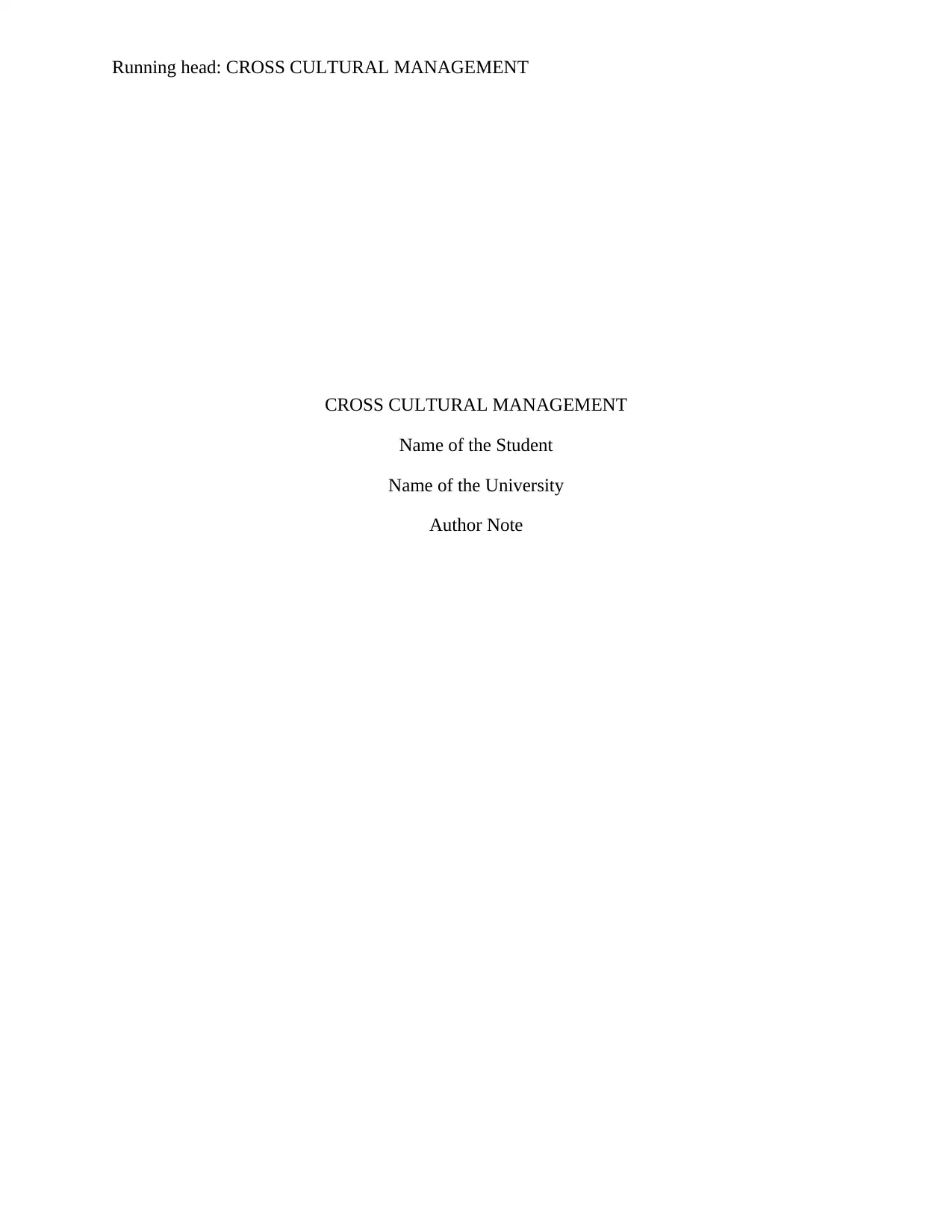
Running head: CROSS CULTURAL MANAGEMENT
CROSS CULTURAL MANAGEMENT
Name of the Student
Name of the University
Author Note
CROSS CULTURAL MANAGEMENT
Name of the Student
Name of the University
Author Note
Paraphrase This Document
Need a fresh take? Get an instant paraphrase of this document with our AI Paraphraser
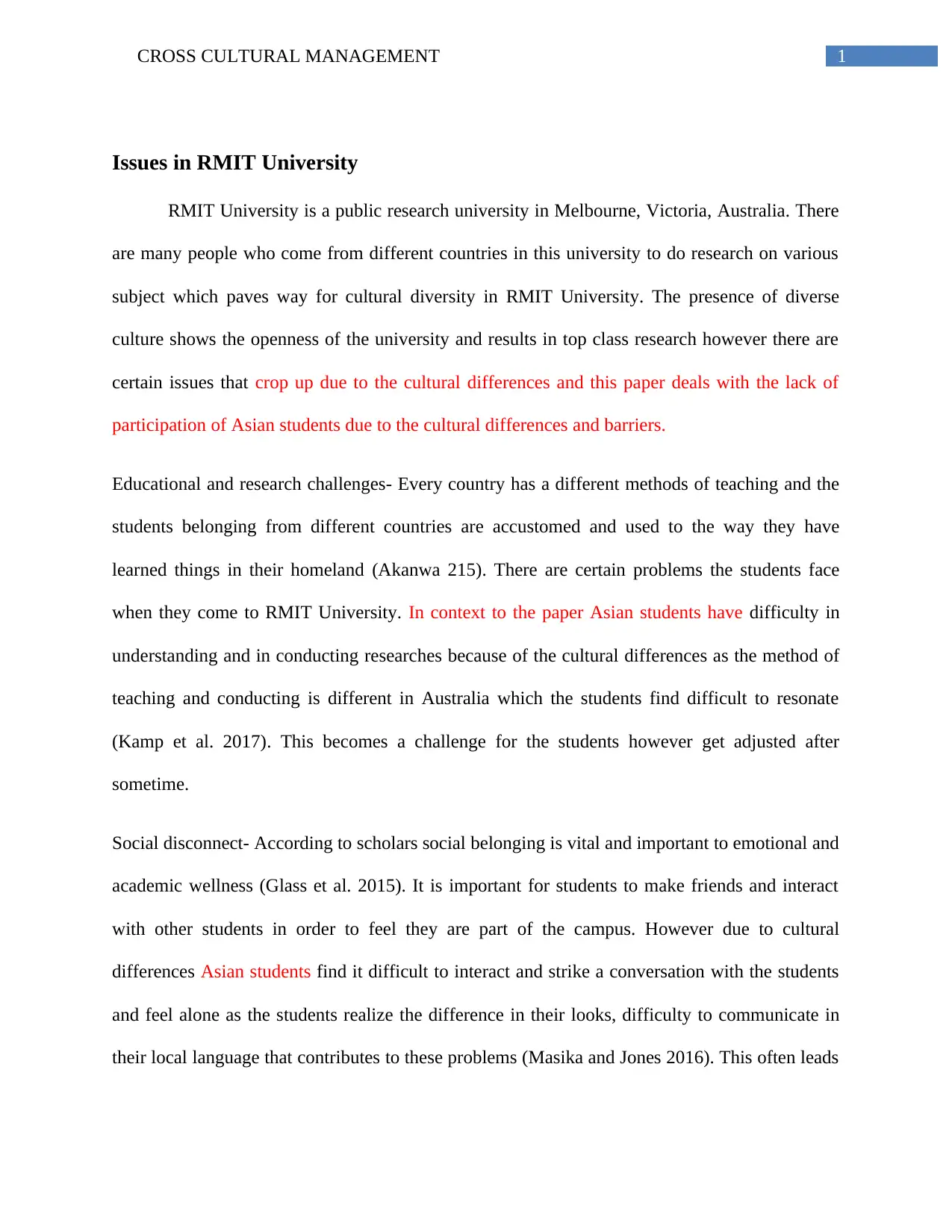
1CROSS CULTURAL MANAGEMENT
Issues in RMIT University
RMIT University is a public research university in Melbourne, Victoria, Australia. There
are many people who come from different countries in this university to do research on various
subject which paves way for cultural diversity in RMIT University. The presence of diverse
culture shows the openness of the university and results in top class research however there are
certain issues that crop up due to the cultural differences and this paper deals with the lack of
participation of Asian students due to the cultural differences and barriers.
Educational and research challenges- Every country has a different methods of teaching and the
students belonging from different countries are accustomed and used to the way they have
learned things in their homeland (Akanwa 215). There are certain problems the students face
when they come to RMIT University. In context to the paper Asian students have difficulty in
understanding and in conducting researches because of the cultural differences as the method of
teaching and conducting is different in Australia which the students find difficult to resonate
(Kamp et al. 2017). This becomes a challenge for the students however get adjusted after
sometime.
Social disconnect- According to scholars social belonging is vital and important to emotional and
academic wellness (Glass et al. 2015). It is important for students to make friends and interact
with other students in order to feel they are part of the campus. However due to cultural
differences Asian students find it difficult to interact and strike a conversation with the students
and feel alone as the students realize the difference in their looks, difficulty to communicate in
their local language that contributes to these problems (Masika and Jones 2016). This often leads
Issues in RMIT University
RMIT University is a public research university in Melbourne, Victoria, Australia. There
are many people who come from different countries in this university to do research on various
subject which paves way for cultural diversity in RMIT University. The presence of diverse
culture shows the openness of the university and results in top class research however there are
certain issues that crop up due to the cultural differences and this paper deals with the lack of
participation of Asian students due to the cultural differences and barriers.
Educational and research challenges- Every country has a different methods of teaching and the
students belonging from different countries are accustomed and used to the way they have
learned things in their homeland (Akanwa 215). There are certain problems the students face
when they come to RMIT University. In context to the paper Asian students have difficulty in
understanding and in conducting researches because of the cultural differences as the method of
teaching and conducting is different in Australia which the students find difficult to resonate
(Kamp et al. 2017). This becomes a challenge for the students however get adjusted after
sometime.
Social disconnect- According to scholars social belonging is vital and important to emotional and
academic wellness (Glass et al. 2015). It is important for students to make friends and interact
with other students in order to feel they are part of the campus. However due to cultural
differences Asian students find it difficult to interact and strike a conversation with the students
and feel alone as the students realize the difference in their looks, difficulty to communicate in
their local language that contributes to these problems (Masika and Jones 2016). This often leads
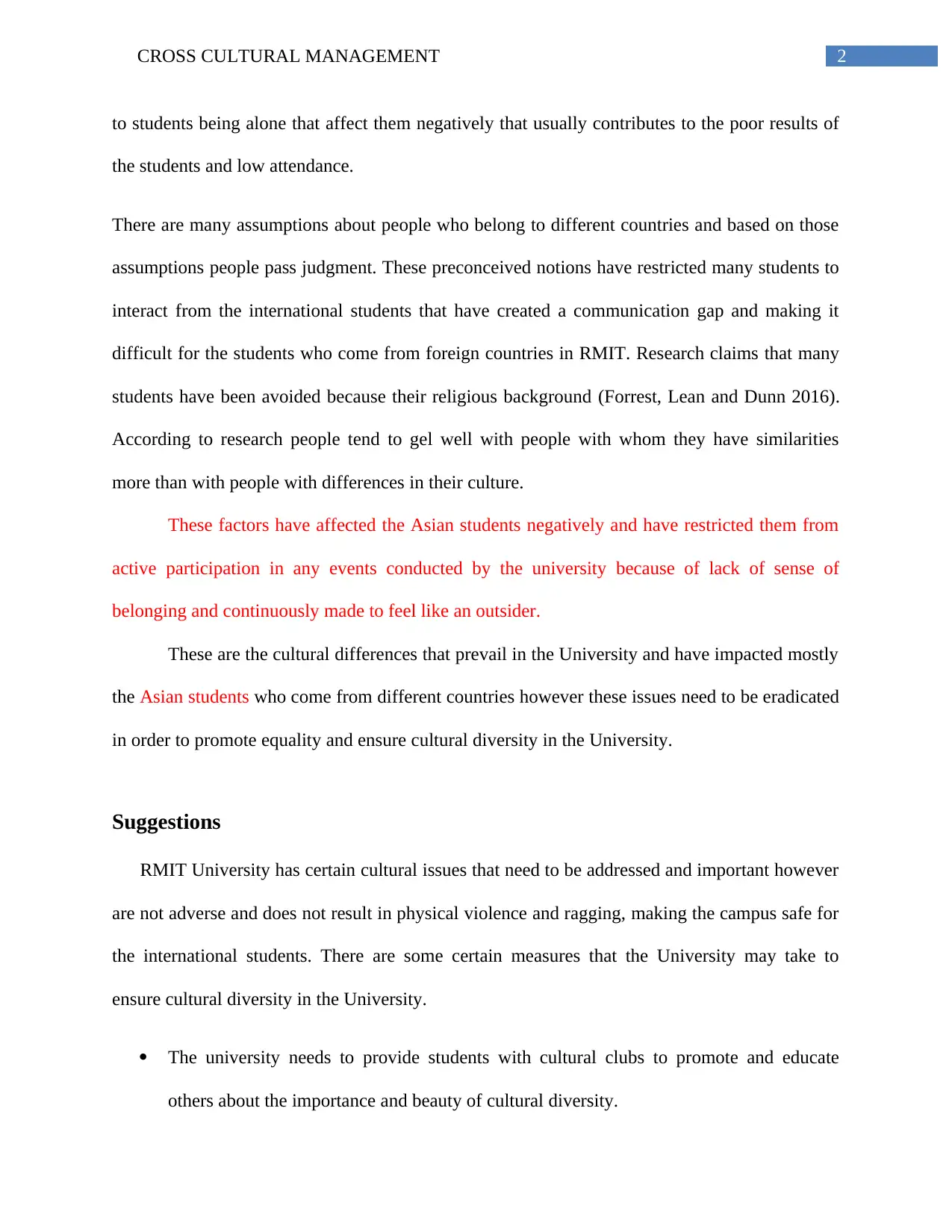
2CROSS CULTURAL MANAGEMENT
to students being alone that affect them negatively that usually contributes to the poor results of
the students and low attendance.
There are many assumptions about people who belong to different countries and based on those
assumptions people pass judgment. These preconceived notions have restricted many students to
interact from the international students that have created a communication gap and making it
difficult for the students who come from foreign countries in RMIT. Research claims that many
students have been avoided because their religious background (Forrest, Lean and Dunn 2016).
According to research people tend to gel well with people with whom they have similarities
more than with people with differences in their culture.
These factors have affected the Asian students negatively and have restricted them from
active participation in any events conducted by the university because of lack of sense of
belonging and continuously made to feel like an outsider.
These are the cultural differences that prevail in the University and have impacted mostly
the Asian students who come from different countries however these issues need to be eradicated
in order to promote equality and ensure cultural diversity in the University.
Suggestions
RMIT University has certain cultural issues that need to be addressed and important however
are not adverse and does not result in physical violence and ragging, making the campus safe for
the international students. There are some certain measures that the University may take to
ensure cultural diversity in the University.
The university needs to provide students with cultural clubs to promote and educate
others about the importance and beauty of cultural diversity.
to students being alone that affect them negatively that usually contributes to the poor results of
the students and low attendance.
There are many assumptions about people who belong to different countries and based on those
assumptions people pass judgment. These preconceived notions have restricted many students to
interact from the international students that have created a communication gap and making it
difficult for the students who come from foreign countries in RMIT. Research claims that many
students have been avoided because their religious background (Forrest, Lean and Dunn 2016).
According to research people tend to gel well with people with whom they have similarities
more than with people with differences in their culture.
These factors have affected the Asian students negatively and have restricted them from
active participation in any events conducted by the university because of lack of sense of
belonging and continuously made to feel like an outsider.
These are the cultural differences that prevail in the University and have impacted mostly
the Asian students who come from different countries however these issues need to be eradicated
in order to promote equality and ensure cultural diversity in the University.
Suggestions
RMIT University has certain cultural issues that need to be addressed and important however
are not adverse and does not result in physical violence and ragging, making the campus safe for
the international students. There are some certain measures that the University may take to
ensure cultural diversity in the University.
The university needs to provide students with cultural clubs to promote and educate
others about the importance and beauty of cultural diversity.
⊘ This is a preview!⊘
Do you want full access?
Subscribe today to unlock all pages.

Trusted by 1+ million students worldwide
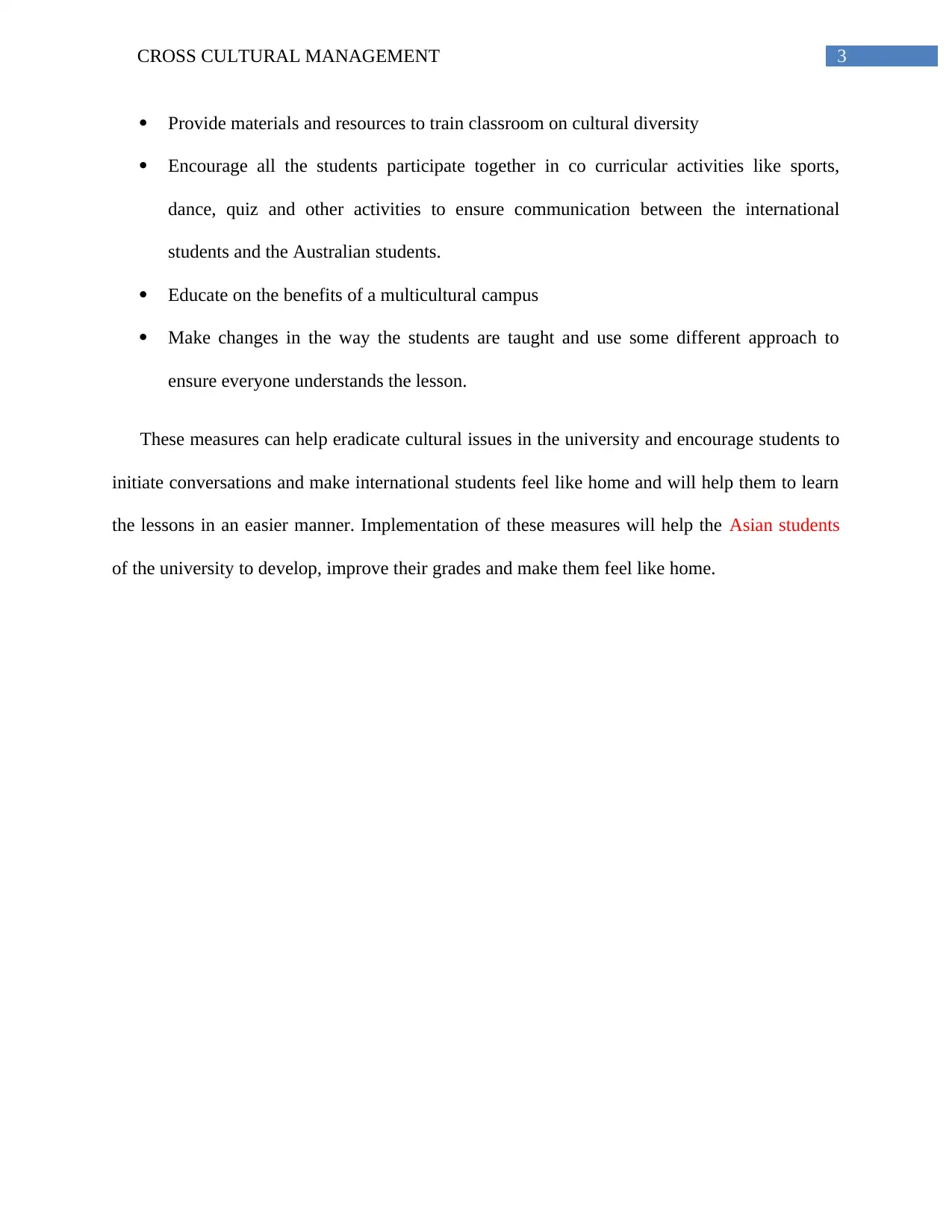
3CROSS CULTURAL MANAGEMENT
Provide materials and resources to train classroom on cultural diversity
Encourage all the students participate together in co curricular activities like sports,
dance, quiz and other activities to ensure communication between the international
students and the Australian students.
Educate on the benefits of a multicultural campus
Make changes in the way the students are taught and use some different approach to
ensure everyone understands the lesson.
These measures can help eradicate cultural issues in the university and encourage students to
initiate conversations and make international students feel like home and will help them to learn
the lessons in an easier manner. Implementation of these measures will help the Asian students
of the university to develop, improve their grades and make them feel like home.
Provide materials and resources to train classroom on cultural diversity
Encourage all the students participate together in co curricular activities like sports,
dance, quiz and other activities to ensure communication between the international
students and the Australian students.
Educate on the benefits of a multicultural campus
Make changes in the way the students are taught and use some different approach to
ensure everyone understands the lesson.
These measures can help eradicate cultural issues in the university and encourage students to
initiate conversations and make international students feel like home and will help them to learn
the lessons in an easier manner. Implementation of these measures will help the Asian students
of the university to develop, improve their grades and make them feel like home.
Paraphrase This Document
Need a fresh take? Get an instant paraphrase of this document with our AI Paraphraser
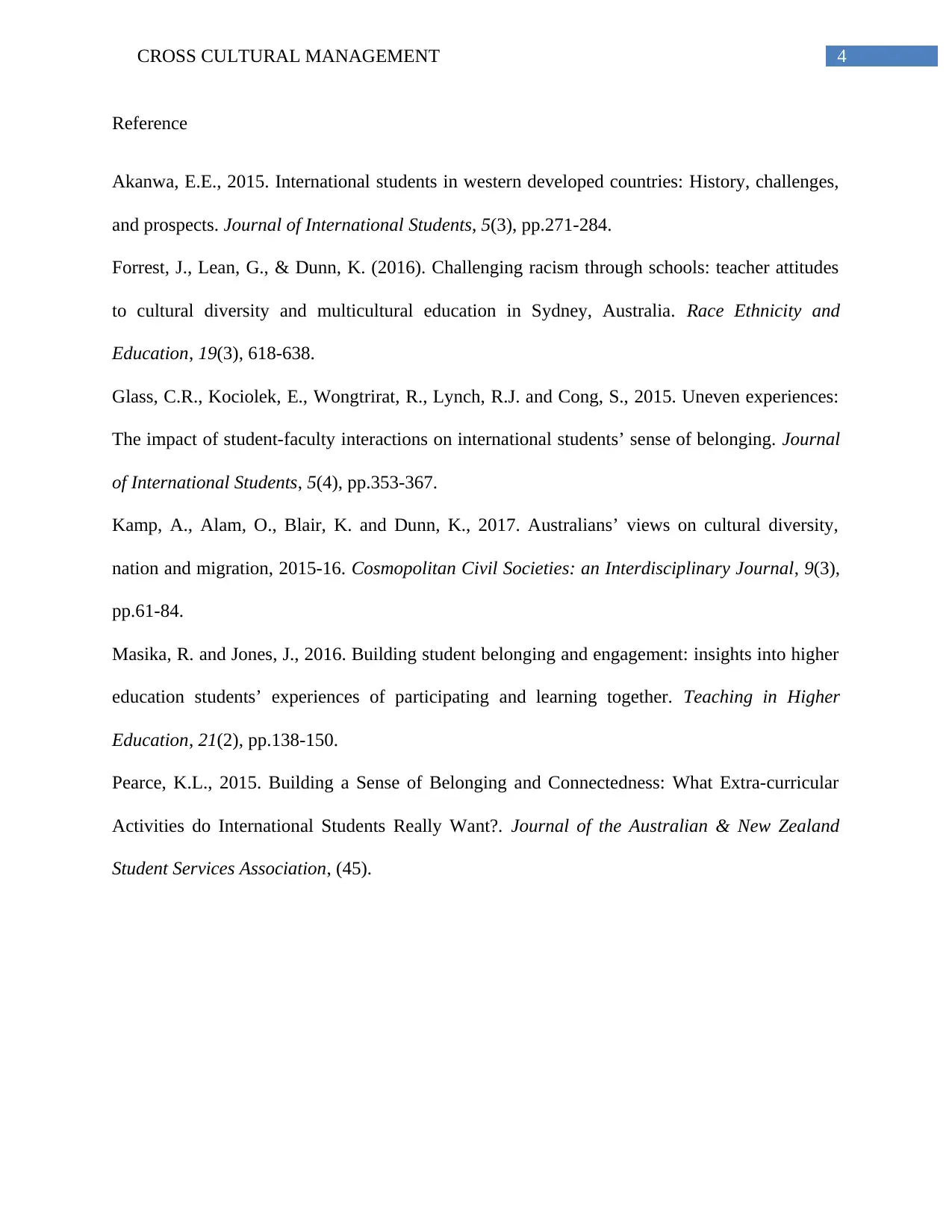
4CROSS CULTURAL MANAGEMENT
Reference
Akanwa, E.E., 2015. International students in western developed countries: History, challenges,
and prospects. Journal of International Students, 5(3), pp.271-284.
Forrest, J., Lean, G., & Dunn, K. (2016). Challenging racism through schools: teacher attitudes
to cultural diversity and multicultural education in Sydney, Australia. Race Ethnicity and
Education, 19(3), 618-638.
Glass, C.R., Kociolek, E., Wongtrirat, R., Lynch, R.J. and Cong, S., 2015. Uneven experiences:
The impact of student-faculty interactions on international students’ sense of belonging. Journal
of International Students, 5(4), pp.353-367.
Kamp, A., Alam, O., Blair, K. and Dunn, K., 2017. Australians’ views on cultural diversity,
nation and migration, 2015-16. Cosmopolitan Civil Societies: an Interdisciplinary Journal, 9(3),
pp.61-84.
Masika, R. and Jones, J., 2016. Building student belonging and engagement: insights into higher
education students’ experiences of participating and learning together. Teaching in Higher
Education, 21(2), pp.138-150.
Pearce, K.L., 2015. Building a Sense of Belonging and Connectedness: What Extra-curricular
Activities do International Students Really Want?. Journal of the Australian & New Zealand
Student Services Association, (45).
Reference
Akanwa, E.E., 2015. International students in western developed countries: History, challenges,
and prospects. Journal of International Students, 5(3), pp.271-284.
Forrest, J., Lean, G., & Dunn, K. (2016). Challenging racism through schools: teacher attitudes
to cultural diversity and multicultural education in Sydney, Australia. Race Ethnicity and
Education, 19(3), 618-638.
Glass, C.R., Kociolek, E., Wongtrirat, R., Lynch, R.J. and Cong, S., 2015. Uneven experiences:
The impact of student-faculty interactions on international students’ sense of belonging. Journal
of International Students, 5(4), pp.353-367.
Kamp, A., Alam, O., Blair, K. and Dunn, K., 2017. Australians’ views on cultural diversity,
nation and migration, 2015-16. Cosmopolitan Civil Societies: an Interdisciplinary Journal, 9(3),
pp.61-84.
Masika, R. and Jones, J., 2016. Building student belonging and engagement: insights into higher
education students’ experiences of participating and learning together. Teaching in Higher
Education, 21(2), pp.138-150.
Pearce, K.L., 2015. Building a Sense of Belonging and Connectedness: What Extra-curricular
Activities do International Students Really Want?. Journal of the Australian & New Zealand
Student Services Association, (45).

5CROSS CULTURAL MANAGEMENT
⊘ This is a preview!⊘
Do you want full access?
Subscribe today to unlock all pages.

Trusted by 1+ million students worldwide
1 out of 6
Related Documents
Your All-in-One AI-Powered Toolkit for Academic Success.
+13062052269
info@desklib.com
Available 24*7 on WhatsApp / Email
![[object Object]](/_next/static/media/star-bottom.7253800d.svg)
Unlock your academic potential
Copyright © 2020–2026 A2Z Services. All Rights Reserved. Developed and managed by ZUCOL.





